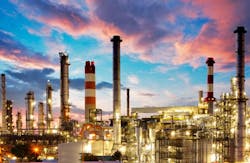The U.S. Energy Information Administration (EIA) has released its annual Refinery Capacity Report, which provides a detailed snapshot of the state of refineries in the United States and the way the U.S. refinery industry is developing. This year's report paints a picture of a market governed by refinery expansions, sales and closures, the EIA said.
As of Jan. 1, 2013, there were 139 refineries operating in the United States and four idle refineries, which are sites where the atmospheric crude oil distillation unit (ACDU) is not currently functioning and not under active repair, but could be brought back into operation over a maximum of 30 days. The combined atmospheric crude oil distillation capacity of all U.S. refineries came in at 17.8 million barrels per day, which was just over 500,000 barrels per day more than 12 months ago. Of those, almost 16.8 million barrels per day were produced by operating refineries, while the remainder was estimated to be the total capacity of the idle refineries, the report noted.
The EIA attributes the increase in capacity from a year ago mostly to the expansion of Texas-based Motiva's Port Arthur Refinery. Motiva, which is a joint venture between Shell Oil Company and Saudi Refining, expanded its production capacity from 285,000 barrels per day in 2012 to 600,250 barrels per day at the beginning of 2013, which turned it into the largest refinery in the United States. In addition, the overall increase has been driven by the relaunching of the Trainer refinery in Pennsylvania, previously owned by Philips 66 but now operated by Monroe Energy, owned by Delta Air Lines.
RELATED: Energy experts see benefits of rail over pipe in crude transportation
Over the course of 2013 the U.S. refinery market is set to change, due to a number of large scale deals. For example, BP has sold two of its refineries, located in Texas City and in Carson, Calif. The former was purchased by Marathon Petroleum Corporation in February, which is now the third largest U.S. refiner. The latter was taken over by San Antonio-based Tesoro, which thus became the largest refiner in the West Coast. In turn, Tesoro sold its Ewa Beach, Hawaii refinery to Par Petroleum Corporation. Meanwhile, BP intends to increase its processing capabilities at its Indiana refinery, expanding its coking capacity to 102,000 barrels per day, the EIA noted.
Although crude distillation capacity is the most widely monitored indicator of refinery size, the capacity of secondary units can give an idea of how refineries are developing as well. However, their expansion can vary over time, as refiners adjust the specific types of capacity needed for different crude and product qualities. Last year the EIA registered a rise in vacuum distillation, thermal cracking, catalytic hydrocracking, catalytic reforming and hydrotreating capacity, whereas deasphalting capacity dropped and catalytic cracking capacity remained unchanged. This year, secondary unit capacity expansion is still going on, as companies try to ramp up production of ultra-low-sulfur diesel, the report pointed out.



